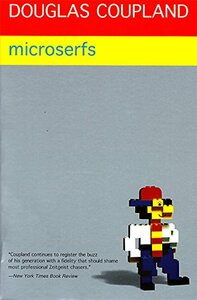You need to sign in or sign up before continuing.
Take a photo of a barcode or cover
This was probably even funnier/more interesting if I'd read it in the mid-90s, which is when it was set and when it was written; it hasn't entirely stood the test of time. The book revolves around a set of low-level employees (serfs) who work at Microsoft and realize they don't really have a life of their own outside work and decide to make some big changes. The plot meanders, and there isn't a ton of coflict/suspense, but you find yourself hoping for the best for the characters anyway. Despite my criticisms, found it charming and enjoyable.
2024 reads, 8/22
“The stock closed up $1.75 on Friday. Bill has 78,000,000 shares, so that means he’s now $136.5 million richer. I have almost no stock, and this means I am a loser.”
The title of this book tells you all you really need to know – Microserfs, a portmanteau of “Microsoft” and the feudal “serfs,” is about a group of programmers working at Microsoft who take the risk and start their own software company. Really, it’s a nineties version of HBO’s Silicon Valley.
This is an epistolary novel, but instead of a diary or letters, narrator Dan Underwood types all his thoughts in a “PowerBook entry,” filled not just with his day-to-day life, but with random notes and emails, complete with typos and grammatical errors to really give it that “draft word document” feel.
“Note: I think Starbucks has patented a new configuration of the water molecule, like in a Kurt Vonnegut novel, or something. This molecule allows their coffee to remain liquid at temperatures over 212° Fahrenheit. How do they get their coffee so hot? It takes hours to cool off—it’s so hot it’s undrinkable—and by the time it’s cool, you’re sick of waiting for it to cool and that ‘coffee moment’ has passed.”
I was born in 1995, so while I obviously cannot relate to these characters, Coupland does an excellent job of immersing you in this era of young programmers through his skillful incorporation of pop culture references. It’s a nice little slice of the nineties, infused with humor, quirkiness, and heartwarming moments.
“Checked the WinQuote: The stock was down 86 cents over the day. That means Bill lost $70 million today, whereas I only lost fuck all. But guess who’ll sleep better?”
“The stock closed up $1.75 on Friday. Bill has 78,000,000 shares, so that means he’s now $136.5 million richer. I have almost no stock, and this means I am a loser.”
The title of this book tells you all you really need to know – Microserfs, a portmanteau of “Microsoft” and the feudal “serfs,” is about a group of programmers working at Microsoft who take the risk and start their own software company. Really, it’s a nineties version of HBO’s Silicon Valley.
This is an epistolary novel, but instead of a diary or letters, narrator Dan Underwood types all his thoughts in a “PowerBook entry,” filled not just with his day-to-day life, but with random notes and emails, complete with typos and grammatical errors to really give it that “draft word document” feel.
“Note: I think Starbucks has patented a new configuration of the water molecule, like in a Kurt Vonnegut novel, or something. This molecule allows their coffee to remain liquid at temperatures over 212° Fahrenheit. How do they get their coffee so hot? It takes hours to cool off—it’s so hot it’s undrinkable—and by the time it’s cool, you’re sick of waiting for it to cool and that ‘coffee moment’ has passed.”
I was born in 1995, so while I obviously cannot relate to these characters, Coupland does an excellent job of immersing you in this era of young programmers through his skillful incorporation of pop culture references. It’s a nice little slice of the nineties, infused with humor, quirkiness, and heartwarming moments.
“Checked the WinQuote: The stock was down 86 cents over the day. That means Bill lost $70 million today, whereas I only lost fuck all. But guess who’ll sleep better?”
One of those interesting-food-for-thought-but-not-much-of-a-story kind of novels.
When asked, I always list Microserfs as my favorite book of all time. I read it for the first time when I was 17 - no, 16? - on the recommendation of a coworker. I have continued to read it at least annually for the last nine years, and it is one of the few books that has continued to grow with me. While the subject matter will be dated all too soon, Coupland's simple and heartbreaking observations on what it means to be human are spot on. And it has Legos on the cover.
I have lost at least two copies of this book since I first read it in 1997. I have also read this book at least 10 times since I first read it in 1997. It's strange to now be older than the characters that seemed impossibly old in 1997.
I have lost at least two copies of this book since I first read it in 1997. I have also read this book at least 10 times since I first read it in 1997. It's strange to now be older than the characters that seemed impossibly old in 1997.
A very funny, touching portrait on "having a life" in the mid '90s Silicon Valley culture. Very interesting to compare 20-something culture from this decade to our own.
I genuinely can't believe it's been ten years since I first read this book, but apparently it has been, since I read it in the summer of 1997, right in the midst of the first web boom. It spoke to me then -- about creating your own family, about being happy versus having money and when the two intersect -- and it still resonates with me now. I can't speak to how well Coupland got the Microsoft culture, but I can speak to the fact that his sad, lonely geeks looking for love and connection reminded me of my friends then and still remind me of people I know and love.
This one took me ages and ages to get through. It's a good example of the sort of book I need to learn to put down and come back to later - not a bad book, but one I just wasn't feeling it at that moment. Instead I did my usual, suffered through, and essentially stopped reading. Maybe one of these days I'll learn, but most likely not.
This is the story of a group of Microsoft programmers in the early 90s who leave the company to form a start-up in Silicon Valley. It's written as journal entries on the protagonist's PowerBook. It's a fun trip back to that decade, and while you'd think all of the pop culture references would leave it horribly dated, the central themes the characters obsess over - finding meaning in what you do, balancing work and personal life, health, love, loss - are all timeless. The nerdy side of it even feels quite fresh and forward-thinking for the time. They were developing something similar to Minecraft in their start-up, and the idea of trying to make it big with a small start-up is easily as relevant today as it was back then.
It's a simple plot, a techie slice-of-life novel, which I found very relatable as a programmer in the future version of this world. But the characters all felt a bit flat to me. They just didn't come to life at all, and while they worked as vessels for Coupland to present his hilarious and interesting philosophical musings and rambling observations through, they left me with no attachment to the story. He did do a brilliant job near the end of finally bringing in actual human emotion, but that could have hit so much harder if I had felt anything prior to that.
I really wish I had read this in the 90s. I would have absolutely loved it. Reading it now just made me want to re-read JPod, a mid-2000s take on a programmer's life and the spiritual successor to Microserfs, which I see now isn't nearly as similar as I was led to believe. I typically find Coupland's novels to be entertaining and quick reads, and despite my issues this time, I think I could return to it at some point and get a lot more from it. This time, it was just alright.
Book Blog | Twitter | Instagram
This is the story of a group of Microsoft programmers in the early 90s who leave the company to form a start-up in Silicon Valley. It's written as journal entries on the protagonist's PowerBook. It's a fun trip back to that decade, and while you'd think all of the pop culture references would leave it horribly dated, the central themes the characters obsess over - finding meaning in what you do, balancing work and personal life, health, love, loss - are all timeless. The nerdy side of it even feels quite fresh and forward-thinking for the time. They were developing something similar to Minecraft in their start-up, and the idea of trying to make it big with a small start-up is easily as relevant today as it was back then.
It's a simple plot, a techie slice-of-life novel, which I found very relatable as a programmer in the future version of this world. But the characters all felt a bit flat to me. They just didn't come to life at all, and while they worked as vessels for Coupland to present his hilarious and interesting philosophical musings and rambling observations through, they left me with no attachment to the story. He did do a brilliant job near the end of finally bringing in actual human emotion, but that could have hit so much harder if I had felt anything prior to that.
I really wish I had read this in the 90s. I would have absolutely loved it. Reading it now just made me want to re-read JPod, a mid-2000s take on a programmer's life and the spiritual successor to Microserfs, which I see now isn't nearly as similar as I was led to believe. I typically find Coupland's novels to be entertaining and quick reads, and despite my issues this time, I think I could return to it at some point and get a lot more from it. This time, it was just alright.
Book Blog | Twitter | Instagram
I read this book since I love Jpod and that is suppposed to be a kind of sequel to Microserfs. I like Jpod a lot better. I don't know if it was because the characters in Jpod were the same as me when it was written and Microserf characters were 10 years older? I didn't find the characters as appealing in Microserfs. Some parts of Jpod were absurd and over the top but I loved that about that book. I'm interested in reading some other Douglas Coupland books now. I have Eleanor Rigby-any other suggestions?
Solid 3.5.
Coupland wrote this after “Life After God” which I enjoyed but somehow the short diary entries don’t quite work as well here. But it was ahead of its time, and less cynical about the tech industry than many of the books now.
Coupland wrote this after “Life After God” which I enjoyed but somehow the short diary entries don’t quite work as well here. But it was ahead of its time, and less cynical about the tech industry than many of the books now.




